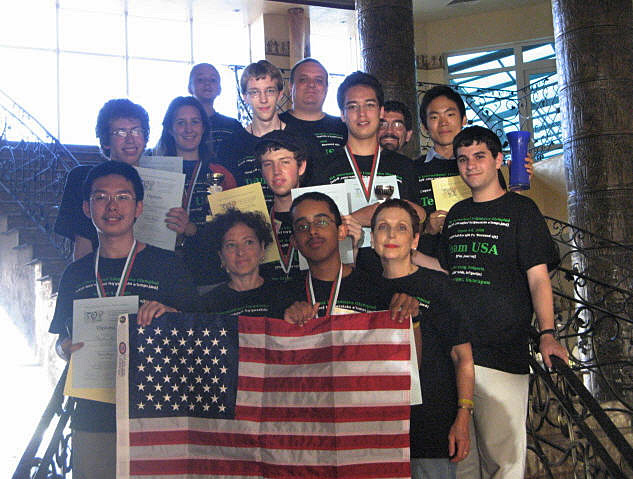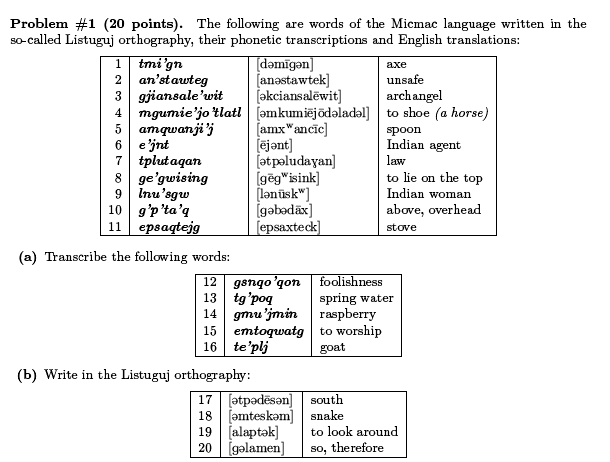Two more U.S. gold medals
« previous post | next post »
 Congratulations to Hanzhi Zhu, who won an individual gold medal; to the team of Jae-Kyu Lee, Rebecca Jacobs, Morris Alper, and Hanzhi Zhu, who won a gold medal in the team competition; and to the other participants who won individual and team silver and bronze medals, as described in the press release on the NSF web site ("Team USA Brings Home the Gold", 8/15/2008).
Congratulations to Hanzhi Zhu, who won an individual gold medal; to the team of Jae-Kyu Lee, Rebecca Jacobs, Morris Alper, and Hanzhi Zhu, who won a gold medal in the team competition; and to the other participants who won individual and team silver and bronze medals, as described in the press release on the NSF web site ("Team USA Brings Home the Gold", 8/15/2008).
We're talking, of course, about the 2008 International Linguistics Olympiad, held in Slanchev Bryag ("Sunny Beach"), Bulgaria.
So far, no press outlets have picked this up, due to the competition from important events like Bigfoot's DNA turning out to be from a possum, a megachurch co-pastor getting acquitted of airport assault charges, and so on. (Though I hope that the uptake will have improved by the time you read this post.)
Perhaps the story would be more popular if the press release gave a more detailed description of the problems and their role in competitive turning points, so that the intrinsic drama of the event is brought more vividly to life. I have in mind things like the heart-breaking moment when the Dutch team omitted a schwa in the phonetic transcription of Micmac te'plj "goat":
The thrill of victory, the agony of scribal error.
Actually, I made that up about the Dutch team, though it's more plausible than the Bigfoot picture, which even the BBC treated with suspicion.
Still, I'm sure that there were many dramatic moments in the competition, if only we knew what they were.
I also have a suggestion for the organizers of the next Linguistics Olympiad (these olympiads are annual, as historically unsound as that may be): how about some crowd-pleasing new events? The folks in Sunny Beach, Bulgaria, missed some obvious opportunities — "beach parsing", anyone? — but next time, how about structural analysis of a corpus of bird song? or a hypothetical linguistic encounter with space aliens?
Maybe I'm getting a little carried away here — though why not a team competition to translate between made-up version of Yeti and Sasquatch, with Olympiad officials in the non-human roles? OK, never mind, but how about a live interaction in the style of Ken Pike's monolingual demonstrations?
I know that Anderson Cooper is probably too busy, but maybe you could get Geoff Nunberg to report on it for Fresh Air. Or if you go with my Yeti-to-Bigfoot idea, there's always the BBC.

Matt said,
August 18, 2008 @ 7:35 am
Hello! I just have an easy question – who wrote the Aymara part of this test? It seems to ignore vowel-suppression in the language… though maybe this is just a simplification.
Tony said,
August 18, 2008 @ 8:58 am
Hi, Mark! I love your post, and I've done a Chinese introduction of the contest here( http://www.yeeyan.com/articles/view/inspired5/12599 ), hopefully we will see some Chinese faces in next year's IOL
Lori Levin said,
August 18, 2008 @ 2:27 pm
Maybe some of the participants will contribute some of their exciting moments and revelations. In them mean time, we are recruiting sites and participants for the 2009 North American contest. If you are at a North American university, we can tell you how to host a contest site. If you are at a North American high school, we can also tell you how to participate. If you are from a country that does not currently have a national contest, we can give you tips on getting started and put you in touch with the International Linguistics Olympiad committee. Our web page is http://www.naclo.cs.cmu.edu.
Guy Tabachnick said,
August 18, 2008 @ 10:29 pm
This competition was a lot of fun; hopefully I'll be able to qualify again for next year in Wrocław. One of the common threads that the American team had was that most, if not all, of us are big fans of Language Log.
One of my favorite problems there—and one of the most diabolical ones—was on Inupiak. They have the wackiest split ergativity system I've come across, and while I'm still not entirely sure what's going on there, I'd like to know more about it. Certainly a fascinating language, and a great problem, like all the others.
David Marjanović said,
August 22, 2008 @ 8:34 am
Just google for Iñupiaq. (Pronounced with [ɲ] and [q].)